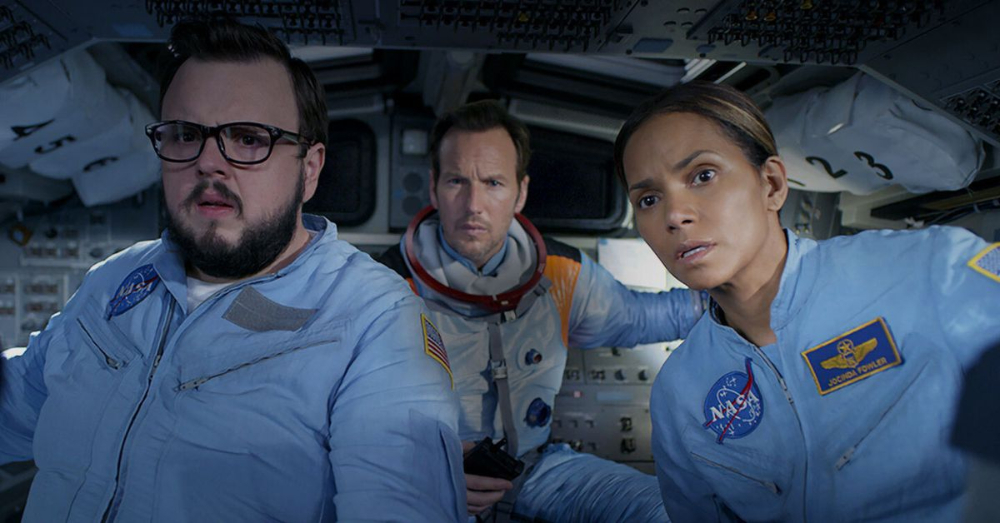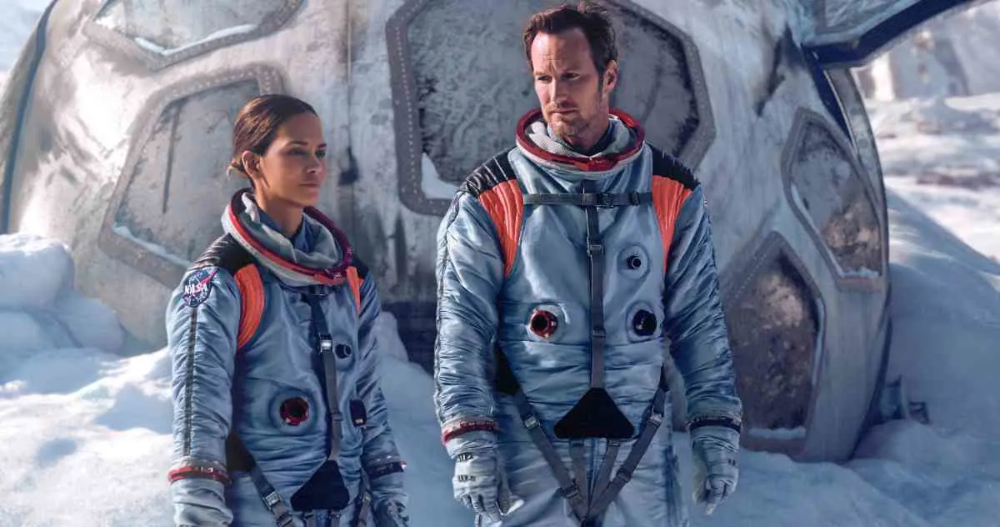
No living director has mastered or popularized the disaster drama quite like German director Roland Emmerich has. From Independence Day to The Day After Tomorrow and even 2012, Emmerich has a unique, grandiose vision for portraying the ends of the world — and beyond. However, his last few attempts, such as the Independence Day sequel and his new movie Moonfall, have largely self-destructed under the heavy weight of the director’s overly grand ambitions. Moonfall finds him a bit closer to form, but audiences will have to keep waiting for Emmerich’s next classic disaster epic.
The premise of Moonfall involves a mysterious force that has caused the Moon’s orbit to change, putting it on a collision course with Earth. With only a few days to stop this world-ending catastrophe, combative astronauts Jo Fowler (Halle Berry) and Brian Harper (Patrick Wilson) team up with conspiracy theorist K.C. Houseman (Game of Thrones’ John Bradley) on an improbable mission to rescue the planet.
In a time-wasting subplot, the family members of our two heroes, each at various levels of estrangement from the main characters, also join forces (improbably, of course) to try to reach safety back on the good old third planet. These include Jo’s militaristic ex-husband (Eme Ikwuakor) and her kid’s babysitter (Kelly Yu), as well as Brian’s estranged son (Charlie Plummer) and his ex-wife’s new husband, who is played by a miscast and underused Michael Pena.
At times, it seems as if this ill-fated sextet was created in the name of diverse casting. At others, it seems like they simply exist to fill screentime. Perhaps they were added to check classic disaster film boxes such as family conflicts, moments of redemption, noble sacrifices, and of course, the smart scientist no one listens to. None of these characters were particularly needed, for the principal trio could have and in fact does indeed provide those disaster flick cliches all on their own.

In any event, just as the humans in this picture can quickly tell something is wrong with the lunar ellipsis and its gravitational pull, as well as the Earth’s own ecosystems, even the most uninformed viewers will instantly and instinctively grasp that something is wrong with Moonfall. For one, it moves too quickly and illogically from one story arc to the next, clearly in a rush to get somewhere while checking off a list of prefatory steps. Secondly, and relatedly, in its haste to get to its grand finale, Moonfall stumbles over itself. An earthquake strikes, which causes an engine to collapse, which results in a crew being dismissed so that the trio of Jo, Brian, and K.C. are left stranded, which means they have no chance of communicating with the military. Why couldn’t the earthquake itself have caused the comms cutoff, for example? The plot just becomes unnecessarily and frustratingly convoluted, which is a problem when viewers are already subjected to the kind of suspect dialogue that has marred several of Emmerich’s films, which rarely grasp how humans actually talk to each other.
When Moonfall comes around to its final reveal, its grandiose denouement, if you will, well… let’s just say that Brian’s earlier joke about K.C. and his conspiracy-minded friends (“they smoke a lot of weed”) injects the right level of levity into the overwrought proceedings. Though Emmerich may fashion his plot twist as revelatory as far as the history of the world goes, his idea is neither original nor particularly clever, and only raises more questions than it answers. Yet again, a far simpler explanation would have sufficed and greatly served the movie.
The same goes for the characters — less would’ve been more here, as simple, personal stories combined with great peril might’ve allowed Emmerich’s imagined heroes to slowly but confidently blossom with greater credibility. Instead of using the first half tactically to set up the growing crisis, Emmerich wastes a lot time forcing the audience to connect with Jo (the working woman who struggles to be a mother), Brian (the disgraced hero who is trying to redeem his life), and K.C. (the nerd with mommy issues who nobody believes), but the attempts at character development simply don’t work, and a potentially brilliant concept gets lost amid a series of wasted opportunities.
Moonfall‘s flaws are incredibly frustrating because the movie itself presents a simple and appealing premise, one that could have been turned into a masterpiece of special effects. SFX supervisor Guillaume Murray probably should win an Oscar for his jaw-dropping work here in collaboration with Scanline VFX, which has worked on several of Emmerich’s movies.

Two sequences, one involving the catastrophic pull of the moon’s gravity on the oceans at a critical moment, the other a Melancholia-type moment of lunar approach, are positively spine-tingling and instantly memorable. There’s no question that it’s worth the extra money to watch this movie on an IMAX screen, if possible. Otherwise, size matters when it comes to an Emmerich movie, and bigger is always better. Those two moments alone are worth the extra money. Not only are they realistic and impressive, but they’re also just what the movie needed, and they arrive at just the right time, thereby saving it from complete annihilation. A pulsating, Hans Zimmer-like score from Harald Kloser (pulling triple duty as the film’s producer and co-writer) and Thomas Wanker adds to the proceedings, as does the rather gloomy cinematography from Robby Baumgartner.
Moonfall will stick in your mind thanks to the awesome collaboration by the aforementioned craftspeople. It will also likely be remembered as one of this year’s biggest missed opportunities, largely because Emmerich has grown both too ambitious and too insecure as a filmmaker. He wants desperately to replicate his past success, so he incorporates elements of those films into Moonfall, be it the scrappy survivors and the daring heroes coming to save them from The Day After Tomorrow or the alien conspiracy theories spouted in Independence Day. Meanwhile, those movies featured characters that were far more likable and multi-dimensional, at least for big-budget blockbusters.
Ultimately, for all of its attempts at copying Emmerich’s earlier success, Moonfall fails to actually capture the simplistic brilliance of those movies. In an effort to go bigger or go home, Emmerich has forgotten that small, simple buildups help the big special effects in his movies land with greater impact. The gimmick of the Moon barreling towards the Earth lends itself to various smaller disaster sequences — terrifying teases of what is to come — all of which appear in his prior work and inexplicably do not show up here. Still, Emmerich persists, or so it seems, in creating a chaotic mess and exploding it all in one grand finale.
Roland Emmerich is still the “master of disaster.” His classic films from the ’90s and ’00s are masterpieces of the genre, a yardstick against which many blockbusters continue to be measured. But even geniuses can find themselves lost at sea, humbled masters who have fallen victim of their own hubris. Emmerich hasn’t made a great disaster movie in nearly 15 years and Moonfall certainly doesn’t end that streak. At most, it serves as his reentry into the orbit of the type of film that made him famous in the first place, and brings him closer to the level of ingenuity that all of us who appreciate films about worldwide catastrophes long for him to achieve again one day.
Grade: C+
Moonfall hits U.S. theaters on Feb. 4, 2022 courtesy of Lionsgate.





